We would like to introduce you to some of the designer lights that we have had on our workbench at "Lampen Suntinger" in Augsburg over the years. The lights were restored by us, mostly newly electrified, photographed and sold. And this is just a very small selection of the lights that have passed through our hands.
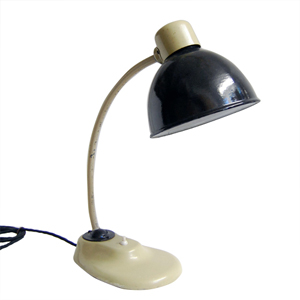 | KANDEM luminaire
Year of design: 30s
Designer: Marianne Brandt (1893-1983)
Manufacturer: Kandem Leuchten, registered as a trademark in 1914.
Available in black or cream-colored metal or with a (transparent) glass base.
Marianne Brandt was a Bauhaus student from 1924 and head of the metal workshop in 1929. From 1926, Brandt initiated and organized a collaboration with the Leipzig company Körting & Mathiesen, which produced lamps under the brand name "Kandem".
Source: Wikipedia |
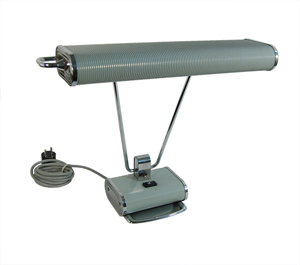 | JUMO Model No. 71Year of design: 1935
Designer: Eileen Grey (1878-1976)
The desk lamp is made of corrugated sheet aluminum and is available in light grey/chrome and black/brass.
The designer Grey, who moved from Ireland to Paris in 1902, is one of the most important designers of the 20th century. She was stylistically close to Art Deco, but left the figurative decoration behind in favor of the geometric design language - the result of the modern approach of form follows function. https://de.wikipedia.org/wiki/Eileen_Gray |
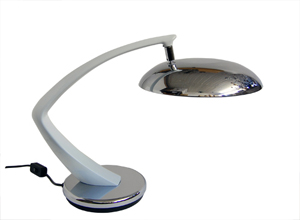 | FASE desk lampFase was founded in Madrid in the early 60s. The lamps are considered a symbol of Spanish industrial design and appear in numerous films, e.g. Almodovar and Mad Man.
There are numerous variations in shape, colour and material, but the distinctive shape is easily recognizable.
The company invested a large budget in marketing and successfully exported the lights to many countries.
The factory disappeared in the 1980s after the end of the Franco dictatorship.
Source:
http://condecorate.com/2013/04/15/historia-de-las-lamparas-fase-la-bella-calidad/ |
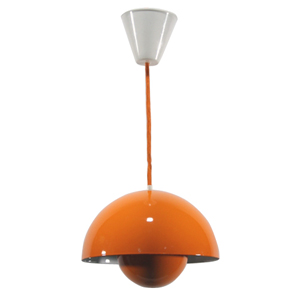 | FLOWER POTYear of design: 1968
Designer: Verner Panton
Manufacturer: Louis Poulsen Lighting, Copenhagen/ Denmark
The simple basic shapes characterize this design by Panton: two hemispherical shade elements on a simple suspension. The light is only reflected indirectly. The brightly colored surface is another typical stylistic device of the 1960s. |
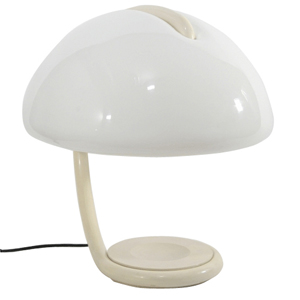 | Serpente Model No. 599Year of design: 1965
Designer: Elio Martinelli
Manufacturer: Marinelli Luce, Lucca / Italy
The round shape of the lamp base with the rising arm that moves far into the hemispherical lampshade made of opal white plastic conveys something organic.
The lamp was produced as a table and floor lamp. |
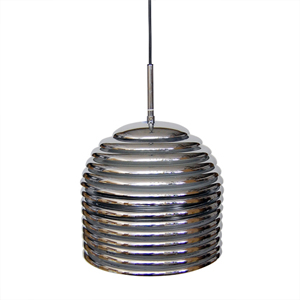 | SaturnoYear of design: 1965
Designer: Kazuo Motozawa
Manufacturer: Yamagiwa, Japan
Ribbed and chrome-plated lampshade.
Was awarded the.iF prize in 1972. Source: 1000 Lights / Charlotte & Peter Fiell |
| |
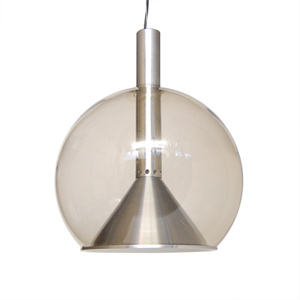 | RAAK luminaireYear of design: 1970
Designer: Frank Ligtelijn
Manufacturer: Raak Leuchten, Netherlands
Suspended lamp made of smoked glass and brushed aluminum. Table lamps, floor lamps and wall lamps were also produced in this striking luminaire design. The designer lamps are no longer produced today, but you can still find lamps by this manufacturer at auctions - often at very high prices. |
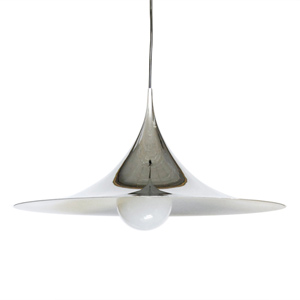 | Semi pendant lampYear of design: 1967
Designer: Claus Bonderup & Torsten Thorup
Manufacturer: Fog & Morup, Aalestrup, Denmark
The reduced, tulip-shaped pendant lamp made of (lacquered) metal became an extremely popular dining table lamp in the mid-1960s. It was produced in various sizes and colors and is now a classic of Scandinavian design.
Source: 1000 Lights / Charlotte & Peter Fiell |
| Kaiser Idell "President" Model No. 6631Year of design: 1931
Designer: Christian Dell
Manufacturer: Kaiser Leuchten
Idell stands for Christian Dell, the designer and former foreman (1922-25) of the Bauhaus. As the name suggests, the "President" series was intended as a desk lamp for the executive floor.
Today, the functional desk lamps from Kaiser Idell are regarded as design classics and are now being produced again (in Denmark). |









